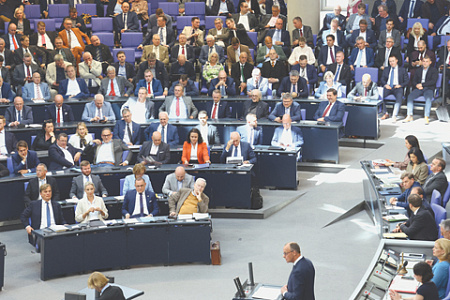
German Chancellor Friedrich Merz presented the government’s course in the field of domestic and foreign policy in the Bundestag. Of the more than 45-minute keynote speech to the deputies, he devoted more than half of the allotted time to European politics.
Merz began his speech with a detailed description of his trips to Paris and Warsaw immediately after the election of the chancellors, as well as conversations with the EU leadership and the NATO Secretary General. He stressed the importance of these two organizations for Germany. Moreover, Merz spoke about his intention to return Germany to the leading role in Europe at all levels.
Long before Merz’s speech, journalists counted six important topics that the Chancellor had to address in his speech. They ranked them in the following order: Ukraine, Alternative for Germany, economy, European politics, migration, and transatlantic relations. Merz started with Europe and then moved on to the Ukrainian crisis, which he blamed on Russia. According to the Chancellor, it was Moscow that violated all the post-war rules in Europe. And according to him, Russia will not stop with Ukraine if it is not stopped. As evidence, he recalled cases of deliberate poisoning, murder, and acts of sabotage allegedly committed in Europe by Russian special services. Of course, he did not comment on President Vladimir Putin’s words about Russia’s lack of aggressive intentions towards Europe.
From this, Merz concludes that Ukraine needs to be supported. However, the chancellor stipulates that Germany will not be a “war party.”That is, German soldiers will not take direct part in the fighting with the Russian army on the side of the Ukrainian Armed Forces. Regarding the possibility of transferring Taurus cruise missiles to Ukraine, with which the Ukrainian Armed Forces could even fire on Moscow, Merz did not say anything this time. Although I have stated this repeatedly in the past as a candidate for chancellor.
Alice Weidel, the leader of the right-wing populist Alternative for Germany (AfD), who opposed the chancellor, drew attention to this circumstance. She assumes that Merz intends to hide the transfer of the Taurus from the public.
However, to intimidate Moscow, Merz announced that the Bundeswehr should become the largest land army in Europe, and for this he proposes to make military service more attractive. However, he did not mention the introduction of compulsory military service in the country, despite the active discussion on this topic in the expert community.
Merz supported Kiev’s negotiating position and spoke in the spirit that peaceful negotiations cannot be conducted over the Ukrainians’ heads and concessions cannot be demanded from them. In this regard, he pointed to the fact of his telephone conversations with American President Donald Trump in order to convince him to join the position of the Europeans and not to conduct separate negotiations with Moscow.
Merz devoted a significant part of his time to the economic situation in the country. He acknowledged that Germany is in recession. To overcome it, the Chancellor intends to use about 150 billion euros for infrastructure investments from an extra-budgetary fund package adopted by the old Bundestag at the initiative of the leaders of the black-red coalition. He described the German infrastructure as outdated.
According to journalists, Merz started talking about economics 19 times. The main thing, according to him, is the transfer of the country’s economy to the stage of growth. The government has certain tools for this. The plan outlined by Merz for Germany’s return to the level of a leading industrial power in Europe primarily provides for tax incentives for industrial companies. He talked about cheaper energy by reducing the tax component in tariffs.
Merz has been criticized by both the Greens and right-wing populists for his ambiguity in energy policy. The Greens did not hear any recipes from the Chancellor to overcome the current shortage of electricity in Germany and reduce the high cost of tariffs. Right-wing populists criticized him for refraining in his speech from mentioning a return to nuclear energy, which he talked about a lot when he was a candidate for chancellor, and from establishing Russian gas supplies that could save the German economy.
In the economic part of his program, Merz mentioned trade conflicts with the United States and China and called for their elimination. China, in his opinion, remains the most important market for Germany and its major business partner. In this regard, the Chancellor expressed concern about the rapprochement between Beijing and Moscow.
The Government’s migration policy aimed at limiting the number of illegal refugees has caused intense debate. And while right-wing populists criticized Merz for the lack of measures to reduce the influx of migrants into the country, the Greens pointed to his departure from the migration policy agreed with Brussels towards its tightening.
Perhaps only the Chancellor’s social program, including pension reform (the opportunity to save for old age will be provided from the age of six) and a reduction in the tax burden for the poor did not cause criticism. The program to boost the construction of municipal housing and measures against rising rents by private landlords were applauded.
From the point of view of Marcel Fratzscher, head of the Berlin Institute for Economic Development (DIW), Merz took the right tone in his relations with business, betting on the need to achieve economic growth.
